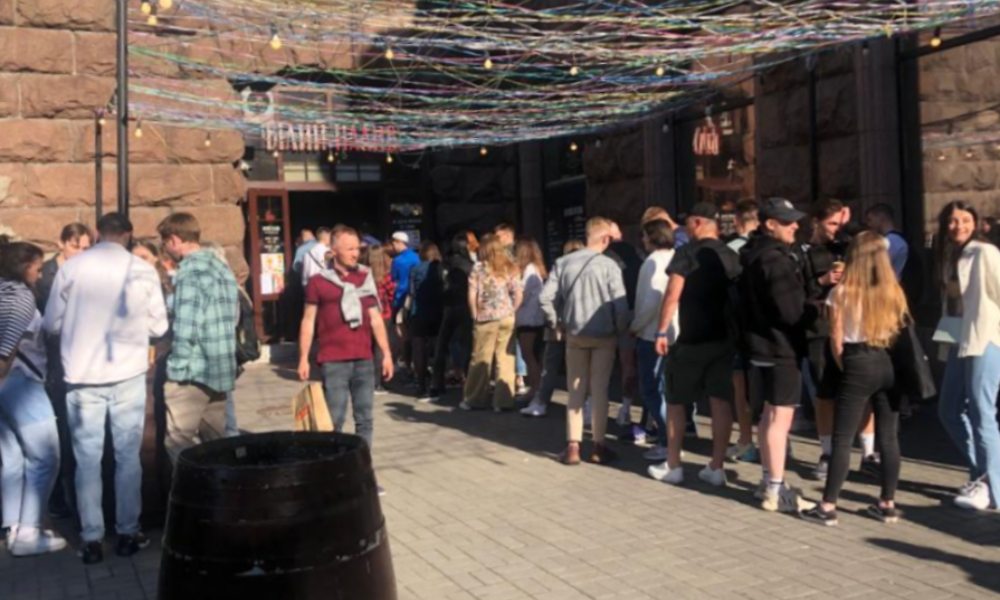
Moment is publishing regular updates from Helen, a Soviet American Jew living in Kyiv. Read all the diary entries here.
The Ukrainian capital celebrated The Day of Kyiv last weekend. There were crowds of people on the streets. I saw a huge line for Kyivska Perepichka, a well-known fast food restaurant. (For me, it is bewildering and hard to understand why people stand for more than an hour to get what is basically a hot dog in traditional Ukrainian deep-fried dough.) Another street food spot where the drinks are cheap also had a shockingly long line. I asked the first person in line how long he had been waiting. An hour and a half!!
There were the same lines before the war, which means the city is back on track.
Ukrainians have missed socializing and crave physical togetherness, even if we are already united by spirits and beliefs.
But many families are still torn apart. Since men under 60 can’t leave the country under martial law; many of them sent their wives and children to safety during the first horrendous days of the war. Those who found escape in the western parts of Ukraine are now coming back. But those who landed in other European countries don’t seem to have that intention.
My husband’s colleague’s wife and their two children, 7 and 9 years old, are in Spain. My beautician is in Germany with her two daughters, while her husband, a doctor, stays in Kyiv. My college friend with her son and his family are in a London suburb. Another friend of ours brought his 9-months-pregnant wife to the Polish border and she ended up delivering the baby in Versailles, France. The baby even got French citizenship!
My question is: Do they plan on coming back? Their children have enrolled in local schools where they will receive a thorough and good education (classes in Ukrainian schools and universities have been sporadically conducted for months, and graduation exams, along with admission tests, have been canceled.) Moreover, the children will be learning foreign languages and eventually have better chances for their careers. If wives visit their husbands in Ukraine, they will lose refugee benefits such as free rent and health insurance. Many of them live in accommodations and conditions that wouldn’t have been imaginable for them in Ukraine.
Now there is a window of opportunity for husbands to visit their wives outside Ukraine. They can go for up to ten days if they volunteer to buy and bring back goods of 5,000 euros in value. It was 20,000 just recently, a sum not many could afford. Now, there are quite a few husbands visiting their wives.
But what does it mean? They have to be on the road most of those days and spend time obtaining the goods. Some people are worried that those ventures are damaging for already vulnerable Ukrainian industries. For example, say a husband brings 5,000 euros’ worth of blankets back from the exhausting trip to see his wife and children and donates them. This saturates the market with free blankets, putting even more pressure on the Ukrainian blanket factory that may already be only partially paying its employees. The same problem affects many other factories that are putting tremendous efforts into rebuilding their businesses.
There are also rumors of wealthy families who had left just before the war on skiing vacations to the Austrian, French or Italian Alps or to seaside resorts taking advantage of the free lodging and resources available to refugees who fled the war. If true, I feel it is a fraud and I would resent such immoral individuals.
Now, all over Kyiv, on city lights and billboards, as well as on mass products such as T-shirts, mugs, etc. there is a new slogan Ukrainians started to use during the war: “Vse Bude Ukraina” (Все Буде Україна). Literally, it means “Everything will be Ukraine,” but translated loosely, it has more the associations of “everything will be fine.” My question is: WHEN?
